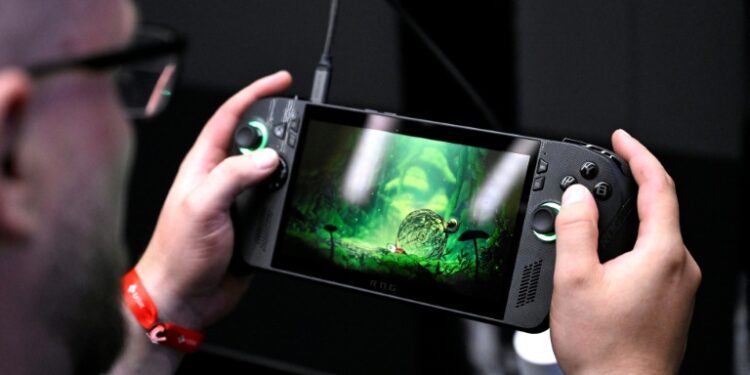Cologne (Germany) (AFP) – The record launch in June for the Nintendo Switch 2, a game console that can be played at home or on the go, heralds a new portable race that Microsoft aims to win with a handheld version of its Xbox. Selling itself as the option for discerning, hardcore gamers, Microsoft’s Xbox ROG Ally console is available to try for the hundreds of thousands of visitors at the Gamescom trade show in Cologne, Germany. The US tech giant said the devices would go on sale from October 16, but has yet to reveal the price.
Born of a partnership with Taiwanese hardware heavyweight Asus, the handheld device includes a central screen with two side grips sporting the same array of joysticks, triggers, and buttons as a familiar Xbox controller. “We’re really designing and building around an entire ecosystem of devices, to allow people to play where they want, how they want,” Jason Ronald, the Microsoft vice president who heads up console development, told reporters.
Microsoft’s console sales have declined, and its Game Pass subscription service has yet to convince large numbers of players, pushing the world’s biggest games publisher to seek new sources of growth.
At 5.8 million units sold in seven weeks, the Switch 2’s mammoth launch figures have other industry players salivating. But “the Switch 2 has that unique thing of games that are nowhere else,” locking in fans of beloved Nintendo franchises like Mario or Zelda, Rhys Elliott of the data firm Alinea Analytics told AFP.
Microsoft’s biggest competitor in the handheld arena is instead another American firm: Valve, which runs the Steam games platform and offers the Steam Deck portable device. Valve says sales of the device have reached several millions since its 2022 launch for the device, which aims at a different market from the Switch. Like the ROG Ally, the Steam Deck was conceived as an on-the-go alternative to a powerful gaming PC.
With its portable, Microsoft is targeting “people that already own Xboxes and potentially a PC,” said Christopher Dring, founder of the specialist website The Game Business. “The bigger goal of this is engagement,” he added. “If you can get your players to play your games more, they will spend more time and money on them even when away from the console in the living room.” Elliott agreed that portables are “complementary” devices to existing consoles.
For now, Japan’s Sony, maker of the PlayStation consoles, is staying out of the portable fight, having withdrawn after 2011’s PlayStation Vita failed to match the success of the 2004-era PlayStation Portable, which scored 76 million sales. Sony never revealed sales figures for the Vita.
But in late 2023, it dipped a toe back into the scene with a new PlayStation Portal, which incorporates a screen that lets users play games running on their console at home via internet streaming. With no official sales figures, some industry sources estimate around two million sales for the device. “Remote play still impacts a very small portion of the overall audience, but it’s growing and is showing strong potential for the future,” Mat Piscatella of the gaming data firm Circana has said.
Gaming media is already abuzz with rumours about a portable version of a future PlayStation 6 — though Sony’s next-generation console is likely years away.
© 2024 AFP


















